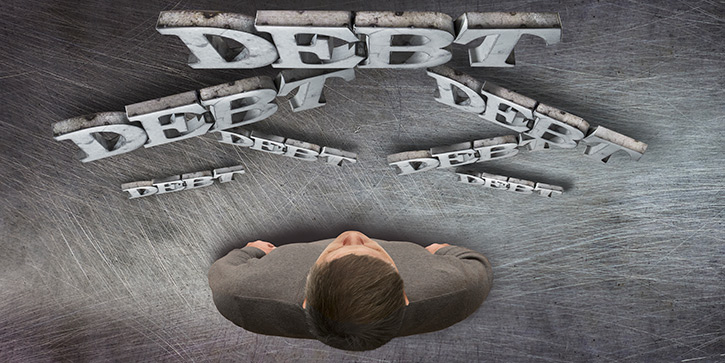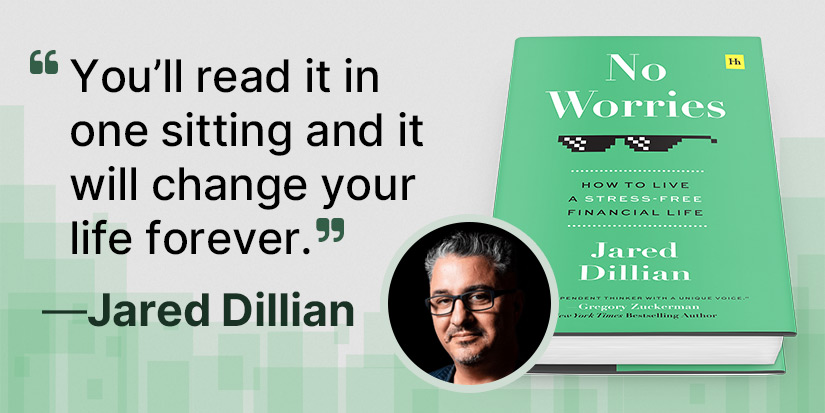
Debt Is the Enemy (Part 2)
-
 Jared Dillian
Jared Dillian
- |
- August 9, 2018
- |
- Comments
Let’s think about what debt is, philosophically speaking.
Debt allows you to enjoy a higher standard of living today, at the expense of having a lower standard of living tomorrow.
Let’s now talk about savings, philosophically speaking.
If you save money, it allows you to have a higher standard of living tomorrow, at the expense of having a lower standard of living today.
So which would you rather do? Would you rather eat ramen noodles at age 25, or Alpo at age 75?
You must pick one or the other. Everyone faces this choice, unless they have help.
Saving “for retirement” is a bit of an abstraction. What does it actually mean?
Well, if you have a high standard of living in retirement, you can travel pretty much wherever you want, and fly first class.
If you have a low standard of living in retirement, you may be stuck in a not-so-nice retirement home.
These are real economic constraints that people have. The more you spend today, the less you get to enjoy tomorrow.
A third option is to make more money, but that doesn’t usually fix people’s bad spending and borrowing habits.
The United States of America
The US is now the third-most indebted country in the world (as measured by total debt-to-GDP), behind Japan and Italy.
This means we have borrowed our standard of living from the future. We enjoy a higher-than-normal standard of living today than we otherwise would, and we will have a lower standard of living in the future.
There is no way around it. As a country, we can do some paper shuffling, and have the Fed print dollars to buy government bonds, and cancel them out, as Japan is contemplating. But you cannot fool the laws of economics. We will just have a lower standard of living because of inflation, rather than austerity.
What do you think people would say, if you gave them the same choice I gave you earlier in this essay?
Like what you're reading?
Get this free newsletter in your inbox every Thursday! Read our privacy policy here.
It’s not the same choice, because the people in charge today will not be around in 30-40 years when the problems from too much debt are realized.
Younger generations, particularly the Millennials, realize—maybe on a subconscious level—that they will be the ones eating the Alpo. Trump, a Baby Boomer and a borrower, engages in classic Baby Boomer behavior—debt is someone else’s problem.
I remember people squawking about debt when I was in business school 20 years ago. It is almost twice as high today. Perhaps that is the reason people never take debt seriously—the margin call never seems to happen. The US is also a special case, because we have the biggest economy in the world and the reserve currency, so we can pretty much do whatever we want.
Debt Is Sometimes Acceptable
General rule of thumb on consumer debt: never borrow anything you can’t outgrow.
For example, don’t take out a car loan at 4% interest if you’re not growing your income more than 4% a year.
I think car loans suck anyway, and you are better off saving and then paying cash for the car, but any debt you can outgrow is not unreasonable.
If your income is stagnant or shrinking, debt is an even more terrible idea because it will be getting larger in real terms.
The case of payday lenders/title lenders/loan sharks is pretty interesting. Here you have debt that is at a 60%-150% interest rate, and people’s knee-jerk reaction is: predatory lending! And yes, in many cases this is predatory. But it can also be a lifeline for someone who is totally stuck, and suddenly experiences a period of rapid growth (like, they get a job), and is able to pay off the loan. True, most of these stories do not have happy endings, and despite the high interest rates, being a predatory lender is not such an easy business.
Also, very few people can buy a house without a mortgage. But that is something you should aspire to! I have done it once in my life. If you must get a mortgage, make it 15 years, so it amortizes more quickly. You will probably observe that you can’t afford as big of a house with a 15 year mortgage. That is the point. Then, pay it off as quickly as possible. If you are diligent, you should be able to pay it off in five years.
Ramen today, or Alpo tomorrow, that is the choice.
And Finally, Student Loans
Student loans fall under the category of debt that you can outgrow.
Unless…
They are so large that you can’t outgrow them!
Stories where young people graduate with $200,000 in debt are not uncommon. $200,000 of debt is difficult to outgrow under any circumstances. Even if you become an investment banker, it is still going to take you some time to pay off a $200,000 loan. And your standard of living will be lower in the meantime.
Here is my rubric for college (and paying for it).
Like what you're reading?
Get this free newsletter in your inbox every Thursday! Read our privacy policy here.
If you get into a top 30 school (the rest of the Ivies, plus others), you should try to keep the debt under $100,000. If you can’t, then don’t go.
Instead, go to a cheaper state school, and keep your total debt under $30,000. Then work twice as hard to create opportunities.
I am not one of these people who believes that an “honors program” at a state school is in any way competitive with a name brand Ivy League school. There is no comparison. But if you can’t make the math work, then don’t do it.
If you’re buried under student loan debt, you can’t buy a car, you can’t buy a house, and you can’t start a family. Some people like to use the term “debt slavery”—I’m not comfortable with that language, but that’s exactly what it is.
And finally, if you have student loan debt, I would not count on some sort of bailout or forgiveness at the federal level. It’s not going to happen—even with a President Bernie. Just pay it off, pay it off, pay it off.
subscribers@mauldineconomics.com
Tags
Suggested Reading...
|
|

 Jared Dillian
Jared Dillian

